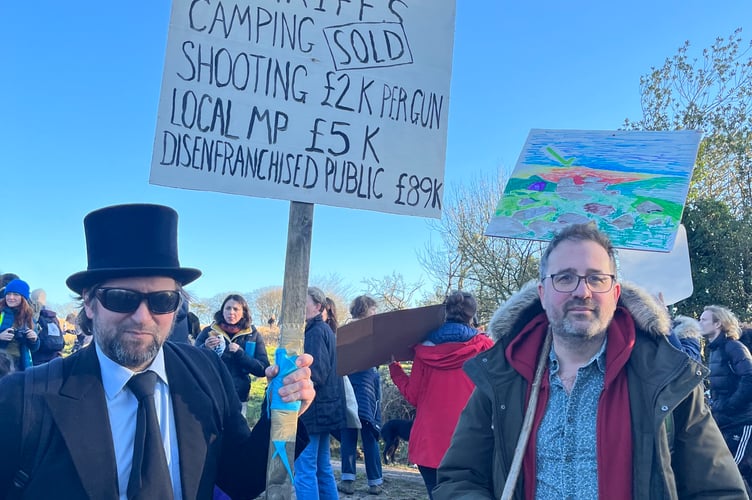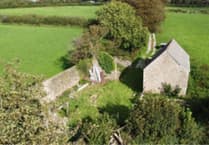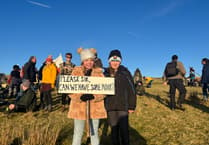THOUSANDS of people gathered on Dartmoor today to protest the recent high court ruling that removed the legal right to camp in the national park without the consent of the landowner.
A procession of over 2000 people stretching almost a mile marched from Cornwood onto Stall Moor, an area of moorland owned by Alexander Darwall and his wife, who brought the case against the national park authority last year. The procession marched directly past Darwall's house, which was heavily guarded by private security.
Demonstrators came from across Devon and beyond, with some travelling from as far as London and Sheffield. While police figures put the attendance at just over 2000, organisers of the event said the number was over 3000.
Neil Powers, the police’s protest liaison officer, said: ‘There’s been no incidents, it’s been extremely peaceful, everything’s gone according to plan. There were a few traffic management issues, but other than that, everybody has been really engaging, really positive and really happy. So for us so far, it’s gone well.’
The protest culminated in the summoning of the spirit of Old Crockern, a mythical spirit said to roam Dartmoor and protect the land.
Max Worthington Dugmore came from Lydford to display his opposition to the ruling. Max said: 'This ruling feels like an injustice, we're here to protect our rights because if we don't, we're going to get railroaded into our own homes for good.
'When everyone was trapped inside our houses during the lockdown, many more people realised that nature is good for their mental health. Taking away or limiting the opportunity to spend a night under the stars seems the wrong direction.
'I do admit there are some bad apples, but there's bound to be. But nobody notices the majority of campers that pitch up, pack up and leave no trace.'

Dan Gluckman came from London to show his support. 'For me, the right to roam is absolutely critical,' said Dan, 'It's part of what being English is all about, having access and a connection to nature and the countryside.
'Too much of England is in private hands. A night camping on Dartmoor is an incredibly special thing, and to have that taken away is devastating.'

Tanya Kovats and Alex Hartley are from Devon, near the Blackdown Hills. After using the moor for hiking and camping for decades, the couple were both worried about what the ruling would mean for future generations.
Tanya said: ‘We love to wild camp on Dartmoor, it’s always a very special, very meaningful experience and a good place to connect back to nature.
‘Our son did Ten Tors, and that meant so much to him and his friends to have that experience, it was really important to their growth. I think this will specifically hit young people and people that are new to camping.
‘But it’s not just the organised events, it’s for anyone. A night out under the stars is so good for your mental health, it gets everything in perspective, and helps you to understand where you belong on the planet. It’s really toxic that someone is using their wealth and power to take that away from people.’

+ 13
(View All)
Alex was also unimpressed with Dartmoor National Park Authority’s recent settlement with landowners. Alex said: ‘We’re not happy with the settlement at all. We don’t have any rights, instead, we get permission that could be taken away at any time.
‘Dartmoor National Park Authority was meant to represent us, but after this agreement, we’re not sure who is meant to be representing us, which is extremely worrying to me. After this ruling as well, I worry that landowners will rethink other permissions as well, such as climbing and riding.
‘The freedom of information act that people asked for found that there were only a handful of incidents in the whole of 2020. Littering is clearly an issue, but there are already laws that cover that, that was already against the law.’
Tanya added: ‘This also isn’t about permission, this is about the last part of England and Wales where this was a right. If it turns into something where you have to ask permission or pay, it will mean that so many people don’t do it.'
Lewis Winks, from the Stars are for Everyone, one of the groups that organised the rally, said: 'People are really fired up about this, because we've seen our access rights eroded and we've seen what was the last vestige of a place where people could legally wild camp up until last Friday snatched away from them. At the moment, we now only have a permissive access agreement in place, but that's not good enough. We're campaigning for access rights to be improved across the board and that starts with returning wild camping rights to Dartmoor.
'There's a huge passion here for responsible access to the outdoors, and we've got 3000 people plus that have turned up here on Dartmoor to show that they really care about this. But we are just the latest in a long line of access protests. Although this is possibly the largest right to roam protest in living memory, since the 1930s.
An agreement has been reached between the national park authority and landowners, in which some wild camping would still be permitted, but the campaign group Right to Roam argues that this still means that there will be at least an 18% reduction in the places where camping is allowed, and that it puts camping in jeopardy in the future.'
Tom Platt, a Director of the Ramblers said: 'It’s disgraceful that these long-standing access rights have been reduced to permissive rights. Dartmoor is a place where you could feel truly free.
'Permission to feel free is not the same thing. While we recognise the efforts of the National Park Authority to ensure the much-loved tradition of wild camping can continue in the short term, the legal right to wild camp on Dartmoor must be re-established.'
The deal also included arrangements to pay landowners for the privilege of exercising what has long been a free public right.
See one of the organisers, Beca, discuss the rally.
Jon Moses from the Right to Roam campaign said: 'The public should not be forced to hand over even more money to major landowners to exercise rights they have long enjoyed. Many of Dartmoor’s landowners are already in receipt of hundreds of thousands of pounds in subsidies from the public purse.'
An interactive map with information on how to camp under the new rules is available here.
Camping on Dartmoor
Dartmoor is the sole remaining area of England and Wales where wild camping in designated areas is legal, without any landowner’s permission. Although all land in Dartmoor National Park is in private hands, local farmers, known as commoners, have had a right to graze their livestock on the wilder, unenclosed areas of the moor for centuries. It is in these same areas that people have been wild camping for over 100 years, with bylaws enacted in 1985 that had legally enshrined the practice.
It is these bylaws that have enabled a range of people from diverse backgrounds to enjoy the moor, either by themselves or through organised expeditions, such as the Duke of Edinburgh treks and the famous Ten Tors Challenge. Opponents of Darwall’s appeal argue that this allows the public to experience the outdoors and responsibly connect with nature. Campaigners also argue that the right to wild camp is more crucial now than ever – citing physical and mental health benefits and its ability to spark environmental care and campaigning.
Writer, Cambridge professor and backer of the Save Our Stars campaign Robert Macfarlane, said: ‘A night under Dartmoor’s skies has been a mind-opening, life-shaping experience for tens of thousands of people down the decades. At this moment of ecological crisis, we've never needed these opportunities to connect deeply with nature more.'
What's at stake in the ruling?
Who is Alexander Darwall?
Not a great deal is known about 59-year-old Alexander Darwall, the man behind the legal challenge. Growing up on Dartmoor, Darwall is now a veteran of the financial world. He manages Devon Equity Management, a hedge fund launched in 2000, making £8 million in profit since 2020.
Darwall and his wife own two country estates, one in Scotland and one on Dartmoor. Blachford Estate is located in southern Dartmoor. The 4000-acre estate is the sixth largest on the moor, including Stall Moor and offering holidays, pheasant hunts and deer stalking.
This is not Darwall’s first run-in with national park users. Eight years ago, Darwall's decision to terminate a permissive agreement allowing people to park near the New Waste area of Dartmoor triggered a petition against the move, signed by over 500 people.
Politically, Darwall has financially supported the UK Independence Party, the Vote Leave campaign and the Conservative party several times.
What is his argument?
The Darwalls’ lawyers argued that the right of access to the moor granted by the 1985 Dartmoor Commons Act never actually included wild camping. In documents obtained by the Guardian newspaper, the Darwalls assert that they ‘cannot effectively enforce their rights against members of the public’, as campers would rely on Dartmoor’s bylaws if legal action was taken by the Darwalls. They therefore successfully pursued a declaration that ‘members of the public are not entitled … to pitch tents or otherwise occupy Stall Moor overnight … except with the claimant’s consent’.
Darwall has also cited issues of littering, anti-social behaviour and so-called 'fly camping' as major issues.
The Dartmoor Commons Owners’ Association supports the legal challenge, with a spokesperson stating: ‘The DCOA acknowledges significant problems for many of its members with fly camping and is keen to see this controlled. There are numerous campsites in the national park (but off the commons) where this can be done inexpensively with sanitation provided. However, there is extensive evidence that the commons are being used for fly camping that involves binge drinking and sometimes drugs, which would not be tolerated at campsites. Fly camping has been getting worse over the last few decades, as cheap equipment and the 'festival culture' have expanded. No one should have to clear up the mess and excrement we often have to deal with.
‘We consider that the intention of landowners, the Dartmoor National Park Authority and the wild camping proponents are the same: to ensure that Dartmoor remains a pristine, unlittered and undamaged environment. Most landowners have a lifetime or multigenerational commitment to the moor, and most have a strong commitment to conservation.
‘We do not envisage circumstances whereby wild camping, including that organised such as by the Ten Tors Challenge and Duke of Edinburgh’s Award Scheme, will be affected on the majority of the Dartmoor commons as a result of the legal case by one owner for clarification of the meaning to Section 10 of the Dartmoor Commons Act 1985. Environmental restrictions will always need to be discussed and agreed upon, as they already have been for many years (such as the avoidance of key bird nesting habitats).’
‘Parts of the Dartmoor commons are currently the only places in England where camping is allowed without consent, so they attract people from many parts of the country. This seems to be one reason why fly camping has become more widespread on Dartmoor. Few visitors to Dartmoor understand the intricacies of what is common land and what is not, or look carefully at the schedule in the bylaws that lists the parts of the commons where camping is currently permitted. Since the early 2000s, social media has undoubtedly played a role in making large numbers of people aware of remote areas where they can park and camp for free.’




